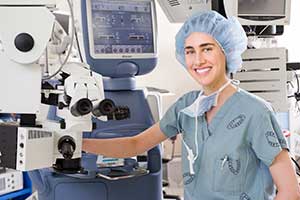Ophthalmology Services
Patient Care
 The Ophthalmology Service is an integral part of the Veterans Health Administration (VHA) health care team. The Service consists of over 1200 ophthalmologists who provide a broad spectrum of medical and surgical care to enrolled Veterans at 136 facilities throughout the United States. Ophthalmologists are MD physicians who have completed four years of medical school followed by an internship and a 3-year ophthalmology residency, training in all aspects (basic, intermediate and advanced) of eye care. Many VHA ophthalmologists undergo additional years of training, including 1 or 2- year fellowships in glaucoma, retinal and vitreous diseases, cornea and external diseases, uveitis (inflammation), neuro-ophthalmology, orbit (eye socket) and oculoplastic surgery, or strabismus (eye muscle) surgery, which allows them to bring specialized expertise to our Veterans.
The Ophthalmology Service is an integral part of the Veterans Health Administration (VHA) health care team. The Service consists of over 1200 ophthalmologists who provide a broad spectrum of medical and surgical care to enrolled Veterans at 136 facilities throughout the United States. Ophthalmologists are MD physicians who have completed four years of medical school followed by an internship and a 3-year ophthalmology residency, training in all aspects (basic, intermediate and advanced) of eye care. Many VHA ophthalmologists undergo additional years of training, including 1 or 2- year fellowships in glaucoma, retinal and vitreous diseases, cornea and external diseases, uveitis (inflammation), neuro-ophthalmology, orbit (eye socket) and oculoplastic surgery, or strabismus (eye muscle) surgery, which allows them to bring specialized expertise to our Veterans.
Ophthalmologists, in conjunction with the Eye Care Team of optometrists, nurses and specialized eye technicians, manage eye conditions that are leading causes of vision loss in Veterans, including cataract, glaucoma, age-related macular degeneration, and diabetic retinopathy. Visual difficulties and eye injuries in Veterans from Operations Iraqi Freedom, Enduring Freedom and New Dawn are treated in VHA facilities. VHA ophthalmology clinics contain advanced diagnostic equipment necessary for diagnosis and management of eye diseases. Injection surgery, laser surgery and minor surgical procedures are performed within the ophthalmology clinic if indicated. Advanced incisional surgeries are performed within VHA operating rooms, with skilled nursing and anesthetists present. Over 54,000 cataract operations were performed in 2012, making it the most common procedure performed in the VHA. Ophthalmologists and optometrists participate in the VA Teleretinal Imaging Screening Program, which allows diabetic patients at remote sites to receive expert evaluation and monitoring of their retinal photographs, improving access and care. Similarly, both professions work with the Veterans Benefits Administration to provide Compensation and Pension examinations on Veterans.
Education and Research
The VA has a long history of affiliation with academic medical centers. 107 of 125 U.S. medical schools are allied with VHA, and many medical students work within ophthalmology clinics. The VA currently supports 320 ophthalmology resident positions, to provide quality care to Veterans and to train the next generation of eye surgeons. The VA Office of Research and Development, in partnership with the Department of Defense (DoD) and the DoD/VA Vision Center of Excellence, provided over 23 million dollars in 2013 for research of eye injuries, diseases and visual problems affecting active duty personnel and Veterans. In summary, ophthalmology service is an integral part of the VHA health care team, fulfilling the missions of patient care, education and research for our Veterans.
*By clicking on these links, you will leave the Department of Veterans Affairs Web site.



















